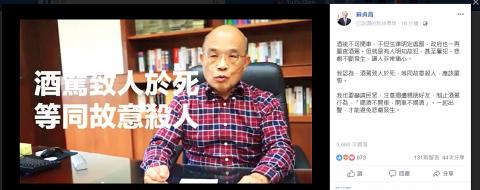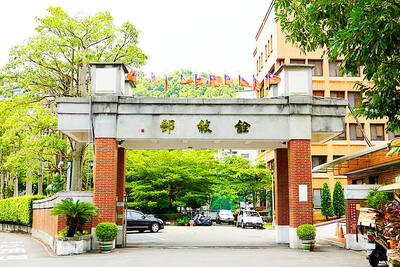Ministry of Justice officials and lawmakers yesterday said they would push for more severe penalties for driving under the influence (DUI) of alcohol after two people were killed on Saturday in an apparent drunk-driving incident.
Officials said they would also propose an amendment to allow homicide charges against DUI offenders.
Chen Jui-ying (陳瑞盈), 48, was allegedly driving in the wrong direction on a road in Taichung’s Dali District (大里) when he plowed into three motorcycles, then hit a taxi and four parked cars, police said.

Photo: Screen grab from Su Tseng-chang’s Facebook account
A 21-year-old man surnamed Peng (彭) and a 25-year-old woman surnamed Cheng (鄭) were struck while riding their motorcycles and died, police added.
Tests found that Chen’s blood-alcohol level was 0.81 milligrams per liter (mg/L), well in excess of the 0.15mg/L legal limit, they said.
His driver’s license had been suspended after he was caught driving under the influence in March last year and again in November, police added.
Chen was yesterday granted bail of NT$3 million (US$97,577), but could not come up with the money.
Peng, a university student majoring in architecture, worked part-time at a cram school and was returning home after a dinner party, police said.
Cheng worked at a local restaurant and was preparing to marry her boyfriend next month, they said.
Peng’s father broke down sobbing and was inconsolable at a police station, where he said Chen was “among the lowest dregs of society.”
“I kept on seeing news reports of drunk drivers killing people and never thought it would happen to my family,” Peng’s father said.
“He was my only son, and his life was just beginning, but now he is dead... Drunk drivers are the most despicable people,” the father said.
Three people were killed in the same district on Jan. 23 when a man surnamed Lai (賴), 41, allegedly drove his minivan through a red light and hit a taxi.
The taxi driver and two passengers died, while a third passenger was injured.
Lai and his passenger sustained serious injuries.
Lai’s blood-alcohol level was 1.39mg/L, police said.
The cases have sparked a public outcry, with many people demanding stricter sentences, including the death penalty, for drunk driving.
Minister of Justice Tsai Ching-hsiang (蔡清祥) has called on the judiciary to improve measures to combat drunk driving.
Law enforcement agencies should impound the vehicles of drivers upon receiving test results showing that their blood-alcohol levels are above the limit, Tsai said.
Repeat offenders should be required to have ignition interlock devices installed in their vehicles, preventing them from driving while intoxicated, he said.
Legislative Speaker Su Jia-chyuan (蘇嘉全) said he would place amending drunk driving legislation on the priority agenda for the upcoming legislative session.
All political parties should tackle the issue by pushing for more severe punishments to deter drunk driving, he said.
Drivers who are found responsible for someone’s death while under the influence face a jail sentence of three to 10 years.

Taiwan Semiconductor Manufacturing Co (TSMC, 台積電) is expected to start construction of its 1.4-nanometer chip manufacturing facilities at the Central Taiwan Science Park (CTSP, 中部科學園區) as early as October, the Chinese-language Liberty Times (the Taipei Times’ sister newspaper) reported yesterday, citing the park administration. TSMC acquired land for the second phase of the park’s expansion in Taichung in June. Large cement, construction and facility engineering companies in central Taiwan have reportedly been receiving bids for TSMC-related projects, the report said. Supply-chain firms estimated that the business opportunities for engineering, equipment and materials supply, and back-end packaging and testing could reach as high as

CHAMPIONS: President Lai congratulated the players’ outstanding performance, cheering them for marking a new milestone in the nation’s baseball history Taiwan on Sunday won their first Little League Baseball World Series (LLBWS) title in 29 years, as Taipei’s Dong Yuan Elementary School defeated a team from Las Vegas 7-0 in the championship game in South Williamsport, Pennsylvania. It was Taiwan’s first championship in the annual tournament since 1996, ending a nearly three-decade drought. “It has been a very long time ... and we finally made it,” Taiwan manager Lai Min-nan (賴敏男) said after the game. Lai said he last managed a Dong Yuan team in at the South Williamsport in 2015, when they were eliminated after four games. “There is

Democratic nations should refrain from attending China’s upcoming large-scale military parade, which Beijing could use to sow discord among democracies, Mainland Affairs Council Deputy Minister Shen You-chung (沈有忠) said. China is scheduled to stage the parade on Wednesday next week to mark the 80th anniversary of Japan’s surrender in World War II. The event is expected to mobilize tens of thousands of participants and prominently showcase China’s military hardware. Speaking at a symposium in Taichung on Thursday, Shen said that Chinese Minister of Foreign Affairs Wang Yi (王毅) recently met with Indian Prime Minister Narendra Modi during a visit to New Delhi.

FINANCES: The KMT plan to halt pension cuts could bankrupt the pension fund years earlier, undermining intergenerational fairness, a Ministry of Civil Service report said The Chinese Nationalist Party (KMT) caucus’ proposal to amend the law to halt pension cuts for civil servants, teachers and military personnel could accelerate the depletion of the Public Service Pension Fund by four to five years, a Ministry of Civil Service report said. Legislative Speaker Han Kuo-yu (韓國瑜) on Aug. 14 said that the Act Governing Civil Servants’ Retirement, Discharge and Pensions (公務人員退休資遣撫卹法) should be amended, adding that changes could begin as soon as after Saturday’s recall and referendum. In a written report to the Legislative Yuan, the ministry said that the fund already faces a severe imbalance between revenue